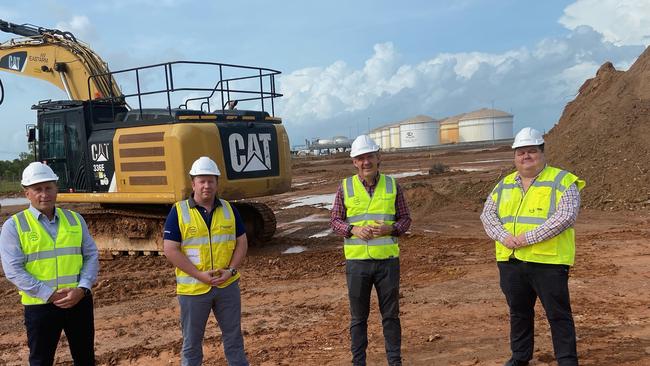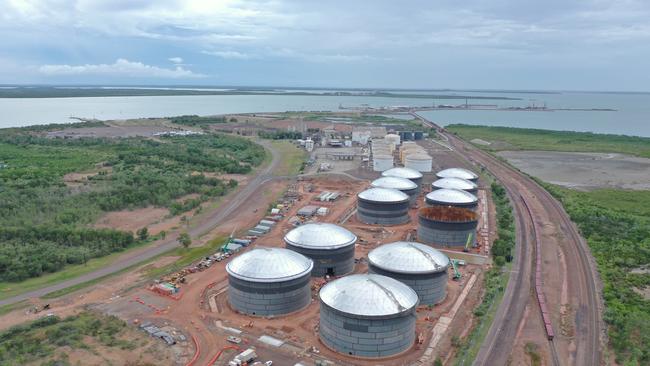Darwin’s US tank farm has been hit by major delays
Delays have dogged construction of key Defence infrastructure in Darwin. Read what’s caused the block.
Business
Don't miss out on the headlines from Business. Followed categories will be added to My News.
The US military could be waiting until next year for the handover of 11 fuel storage tanks currently under construction at Darwin’s East Arm.
Originally scheduled for completion last September, the opening was put back until this July but with just weeks to go, construction flaws and permitting issues continue to dog the $270m development.
The NT News has spoken to people close to the project who said the high-profile infrastructure job was a “catastrophic failure”.
The liners beneath the tanks are leaking, environmental permits remain in limbo and building certifications are unresolved.
Work at the tank farm had begun in January 2022 after Florida-based logistics company Crowley Solutions won the construction tender for the project.

The facility is intended to store 300 million litres of military-grade jet fuel to support American defence activities in the Territory and Indo-Pacific region.
The first signs of slippage in the project became public in April 2023 when engineering contractor Saunders International was replaced as lead builder by Alaskan-headquartered Latitude 63.
At the time of its removal from the project, Saunders told the ASX that Crowley “has decided to restructure” delivery of the facility.
“As a result, Saunders … announces that it has been issued with a ‘Notice of Termination for Convenience’ by Crowley,” its statement said.
The project has coincided with major change at Crowley, which was rocked by the departure of vice president Sean Thomas mid last year, who had a major oversight role in the tank farm.
But the decision to replace Saunders with Latitude 63 does not appear to have resolved longstanding issues with the project construction.

The NT News understands the wrong product was used to stop the fuel seeping from the tanks, with groundwater pushing through the liner.
Intended as impermeable, Latitude 63 is now scrambling to find a solution to the problem.
Instead of using HDPE, a plastic material that could be welded fast, a geo-textile material with clay that observers say is not normally used in tank farm construction.
The NT News also understands permits required around certification of the tanks also remain unresolved.
A spokesperson for the Department of Infrastructure, Planning and Logistics, which has carriage over certification, said under the Act, a building permit was required before work starts, and work must be certified or approved at the end of construction before occupancy.
“This advice has been provided to Crowley,” they said.
Contacted by the NT News, Crowley’s Australian spokesman David Adderwell declined to speak, referring this publication to the company’s US-based media team.
The Environment Protection Authority has also been contacted for details.





